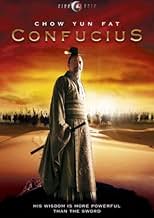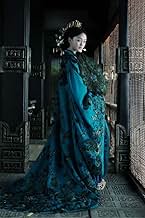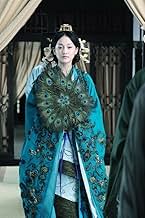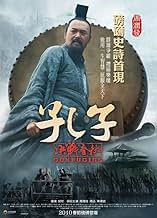IMDb रेटिंग
6.1/10
4.1 हज़ार
आपकी रेटिंग
अपनी भाषा में प्लॉट जोड़ेंThe life story of the highly-influential Chinese philosopher, Confucius.The life story of the highly-influential Chinese philosopher, Confucius.The life story of the highly-influential Chinese philosopher, Confucius.
- पुरस्कार
- 6 जीत और कुल 14 नामांकन
Lu Yao
- The Ruler of Lu
- (as Yao Lu)
Dongyan Ma
- Ran Qiu
- (as Ma Qiang)
फ़ीचर्ड समीक्षाएं
Confucius lived in violent times. He is shown reacting and taking moral stands, often putting himself at risk. And also suffering and losing, which makes it much more realistic. Probably it isn't accurate historically, but there is also not much solid detail about his life. (And no one can be sure if Lao Tzu even existed, never mind teaching Confucius, as is done here.) The man's sentiments have been somewhat modernized, but not unreasonably so. It does show what was positive about him, given the era he lived in.
The film begins with Confucius as an old man, thinking back. Then we see him in his early 50s, being promoted from Major to Minister for Law in his home state of Lu. He is confronted with ethical issues after saving a slave-boy who was due to be buried alive with his former master who has just died. The story then takes many twists and turns and remains interesting.
The film begins with Confucius as an old man, thinking back. Then we see him in his early 50s, being promoted from Major to Minister for Law in his home state of Lu. He is confronted with ethical issues after saving a slave-boy who was due to be buried alive with his former master who has just died. The story then takes many twists and turns and remains interesting.
I just wonder if this movie is another piece of propaganda of Chinese Communist Party as in the case of "Heros", or just a pure marketing stupidity..
Confucius is, above all, a philosopher and a educator. In the Analect, He had to meet with the Wie King "Nam Tu" as he was serving under his reign. Because of this, his disciple was angry with him, and Confucius looked in the sky and swore that he did not do anything wrong and if he did the Heaven would punish him.. as a matter of fact Confucius only met this woman once and for all..
If the Chinese Commie think that by depicting Confucius as a Kon-Fu hero /War hero to attract young modern movie-goers, then it is a pure stupidity..
If the Chinese Commi want to make a propaganda to justify its "unique and indispensable" role in China Modern Society, then this movie is an insult to many young but educated modern Chinese..
It's really sad that such a great historic figure has been portrayed badly just to serve short term political interest.
Well, that 's logical anyway.. The Chinese Commie are so desperate to control their mind-opening-population..especially the young generation.. As Confucius said if you try to govern people by force and deceit, you will fail.
The Totalarian Commie system will fail in 50 years despite economic improvement.
Confucius is, above all, a philosopher and a educator. In the Analect, He had to meet with the Wie King "Nam Tu" as he was serving under his reign. Because of this, his disciple was angry with him, and Confucius looked in the sky and swore that he did not do anything wrong and if he did the Heaven would punish him.. as a matter of fact Confucius only met this woman once and for all..
If the Chinese Commie think that by depicting Confucius as a Kon-Fu hero /War hero to attract young modern movie-goers, then it is a pure stupidity..
If the Chinese Commi want to make a propaganda to justify its "unique and indispensable" role in China Modern Society, then this movie is an insult to many young but educated modern Chinese..
It's really sad that such a great historic figure has been portrayed badly just to serve short term political interest.
Well, that 's logical anyway.. The Chinese Commie are so desperate to control their mind-opening-population..especially the young generation.. As Confucius said if you try to govern people by force and deceit, you will fail.
The Totalarian Commie system will fail in 50 years despite economic improvement.
This is the film that the film bureau of the PRC's State Administration of Radio, Film and Television wanted to pit against Avatar? Really??? This film wouldn't even last five seconds against Judge Judy.
Here is what I learned from the film: Confucius would have made a perfect litigant for Judge Judy's binding arbitration, 'make belief' court, being sued by his wife for back child support and breach of contract by his 'students.' The film portrayed Confucius as a 'bum'--as Judge Judy would say--who abandoned his wife and children after becoming unemployed. He then meandered all over the feudal kingdoms of ancient China, turning down job after job for the next few decades or so while taking on more students to service him, even when he had no funds or resources to see to their education. In his defense, Confucius say: "I want to change things!" However, other than the fairly common desire to see an end to the perpetual conflicts between warring principalities that characterized the Spring and Autumn Period, it is not entirely clear in the film what specific changes he wanted to affect or how his teachings were going to bring about those changes. In fact, other than dispensing one liner fortune cookie wisdom, when did he actually 'teach' in this film?
Now let's put this film into context. As the PRC's communist ideological framework crumbles under the reality of its free market political and economic reforms, the post-socialist Chinese state 're-discovers' once banished Confucian ideals as a way to attempt to re-align its political authority with a moral authority, re-unite the disparate social and political elements of Chinese society, and distinguish the uniqueness of its modernization from Western industrialized countries. But even as a propaganda film meant to promote social values that would reconcile the PRC's authoritarianism with market capitalism, this film fails. It fails because the story was badly scripted and delivered by an over-dramatic acting style reminiscent of the last generation of period Chinese films. It's not smart or stylish, but is desperately trying to be in order to reach a new generation of Chinese movie-goers who would rather be stupefied by films like Avatar instead of being stupefied by films like this.
Two stars, for the women in the film - the only aspect of this film that was not profoundly irritating.
Here is what I learned from the film: Confucius would have made a perfect litigant for Judge Judy's binding arbitration, 'make belief' court, being sued by his wife for back child support and breach of contract by his 'students.' The film portrayed Confucius as a 'bum'--as Judge Judy would say--who abandoned his wife and children after becoming unemployed. He then meandered all over the feudal kingdoms of ancient China, turning down job after job for the next few decades or so while taking on more students to service him, even when he had no funds or resources to see to their education. In his defense, Confucius say: "I want to change things!" However, other than the fairly common desire to see an end to the perpetual conflicts between warring principalities that characterized the Spring and Autumn Period, it is not entirely clear in the film what specific changes he wanted to affect or how his teachings were going to bring about those changes. In fact, other than dispensing one liner fortune cookie wisdom, when did he actually 'teach' in this film?
Now let's put this film into context. As the PRC's communist ideological framework crumbles under the reality of its free market political and economic reforms, the post-socialist Chinese state 're-discovers' once banished Confucian ideals as a way to attempt to re-align its political authority with a moral authority, re-unite the disparate social and political elements of Chinese society, and distinguish the uniqueness of its modernization from Western industrialized countries. But even as a propaganda film meant to promote social values that would reconcile the PRC's authoritarianism with market capitalism, this film fails. It fails because the story was badly scripted and delivered by an over-dramatic acting style reminiscent of the last generation of period Chinese films. It's not smart or stylish, but is desperately trying to be in order to reach a new generation of Chinese movie-goers who would rather be stupefied by films like Avatar instead of being stupefied by films like this.
Two stars, for the women in the film - the only aspect of this film that was not profoundly irritating.
Many people that write on here about films such of this almost have too 'expert' a view. As has been said elsewhere, it is a real epic and the performance by Chow Yun Fat is exceptional. Whilst there is always going to be debate about accuracy, style and even politics about such a film, for lovers of sumptuously shot cinema and outstanding acting, it will be a joy to watch and will open up Confucius the man to many more people. It is actually being widely released in the UK on DVD and Blu Ray on Monday 4th October on the Cine-Asia label, so will be really interesting to see what a much wider audience makes of it. Personally, I think that people will appreciate its quality and see it for what it is - a very well made historical epic movie.
The most controversial and dramatic thing about this movie happened off-screen in mid-January. Many Internet users and related groups called for a boycott of the film when it was reported that China had ordered 2D versions of "Avatar" to be pulled out so that more people would watch "Confucius". However, due to low attendance for "Confucius", and the high demand for "Avatar", the Chinese government reversed their decision and allowed "Avatar" to remain on some 2-D screens in China. The movie was to mark the 60th anniversary of the People's Republic of China and Confucius' 2,560th birthday.
Yes, this is after Mao Zedong's Red Guards condemned the ancient scholar and destroyed his family cemetery and temple in his hometown of Qufu. Ironically, one of Confucius sayings is that "an oppressive government is more to be feared than a tiger".
The first half of the movie traces the rise and popularity of Confucius (played by Chow Yun Fat) in the state of Lu during the Spring and Autumn Period where he is known for his fair and just ideas about running the affairs of the state. He is promoted from town mayor to minister. However, his ideas and practices break with tradition and anger the ruling families. An example is when he saves a burial slave from being entombed alive. He incurs the wrath of the rulers of the surrounding kingdoms by tricking them into giving back seized territory without any violence.
The second half, circa 497 BC, shows Confucius and his disciples in exile, wandering about for years and getting chased away by the locals.
As you can see from the paragraphs above, the first half of this two-hour film is more eventful and interesting than the second. There is a gripping war sequence about the storming of a fort that recalls the action in "Red Cliff." And that's about it for the action fans.
Chow rises to the occasion as the calm and collected Kong Qiu, the revered teacher whose philosophy and views helped to revolutionize some states in China. When political jealousy and fears about his influence send him into exile, the scenes get repetitious and languid. This is punctuated with a subplot about Nan Zi (Zhou Xun), consort to the Wei king who respects the wisdom of Confucius. However, her magnetic appearances are brief and almost cameo-like, leaving most of the second half as prolonged and protracted scenes of Kon Qiu's wanderings and sufferings.
Technically, this US$23-million production looks rich and even stunning at times. Cinematographer Peter Pau (of "Crouching Tiger, Hidden Dragon" fame) captures the period and locations in all their glory and helps to put us in the right mood and atmosphere of the times.
"Confucius" is not a lost cause. It just looks long-drawn messy, like too many cooks having a hand at the broth. - LIM CHANG MOH (limchangmoh.blogspot.com)
Yes, this is after Mao Zedong's Red Guards condemned the ancient scholar and destroyed his family cemetery and temple in his hometown of Qufu. Ironically, one of Confucius sayings is that "an oppressive government is more to be feared than a tiger".
The first half of the movie traces the rise and popularity of Confucius (played by Chow Yun Fat) in the state of Lu during the Spring and Autumn Period where he is known for his fair and just ideas about running the affairs of the state. He is promoted from town mayor to minister. However, his ideas and practices break with tradition and anger the ruling families. An example is when he saves a burial slave from being entombed alive. He incurs the wrath of the rulers of the surrounding kingdoms by tricking them into giving back seized territory without any violence.
The second half, circa 497 BC, shows Confucius and his disciples in exile, wandering about for years and getting chased away by the locals.
As you can see from the paragraphs above, the first half of this two-hour film is more eventful and interesting than the second. There is a gripping war sequence about the storming of a fort that recalls the action in "Red Cliff." And that's about it for the action fans.
Chow rises to the occasion as the calm and collected Kong Qiu, the revered teacher whose philosophy and views helped to revolutionize some states in China. When political jealousy and fears about his influence send him into exile, the scenes get repetitious and languid. This is punctuated with a subplot about Nan Zi (Zhou Xun), consort to the Wei king who respects the wisdom of Confucius. However, her magnetic appearances are brief and almost cameo-like, leaving most of the second half as prolonged and protracted scenes of Kon Qiu's wanderings and sufferings.
Technically, this US$23-million production looks rich and even stunning at times. Cinematographer Peter Pau (of "Crouching Tiger, Hidden Dragon" fame) captures the period and locations in all their glory and helps to put us in the right mood and atmosphere of the times.
"Confucius" is not a lost cause. It just looks long-drawn messy, like too many cooks having a hand at the broth. - LIM CHANG MOH (limchangmoh.blogspot.com)
क्या आपको पता है
- कनेक्शनFeatured in Estrenos Críticos: (Piloto) Bestezuelas, Piratas del Caribe 4... (2011)
- साउंडट्रैकYou Lan Cao
Music by Ou Ge Deng (as Ou Ge)
Lyrics by Foreland Cultural Salon
Performed by Faye Wong
[Theme Song]
टॉप पसंद
रेटिंग देने के लिए साइन-इन करें और वैयक्तिकृत सुझावों के लिए वॉचलिस्ट करें
विवरण
बॉक्स ऑफ़िस
- बजट
- $2,20,00,000(अनुमानित)
- दुनिया भर में सकल
- $45,01,039
- चलने की अवधि
- 2 घं 5 मि(125 min)
- रंग
- ध्वनि मिश्रण
- पक्ष अनुपात
- 2.35 : 1
इस पेज में योगदान दें
किसी बदलाव का सुझाव दें या अनुपलब्ध कॉन्टेंट जोड़ें
























